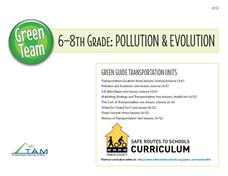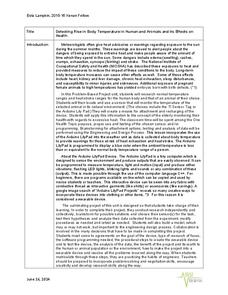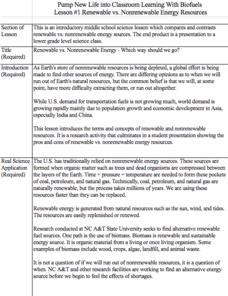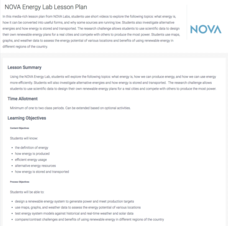Curated OER
The Chesapeake Bay in Captain John Smith's Time
When Captain John Smith visited the Chesapeake Bay in the summer of 1608, what types of animals and habitats did he encounter? Your young historians will analyze primary source documents to answer this question, as well as compare the...
DiscoverE
Water Pollution Cleanup
How do scientists determine the best method for removing pollutants from our water sources? Environmental scholars experiment with pollution clean-up options to discover which are the most cost-effective, fastest, and most thorough....
Curated OER
Salt Marsh in a Pan
Students create a model of a salt marsh to discover the impact of pollution and human activities on water-based habitats including bays and the ocean. They recognize the relationship between natural and developed areas. Students impact...
British Council
Buy. Use. Toss.
Responsible consumption is never a waste of time. Using the engaging resource, scholars learn about the impact of waste on the planet, sorting trash into necessary and luxury piles. They then analyze their consumption habits, writing an...
WE Charity
High School–Module 2: Circular Economy and Nature
Everyone's heard the popular slogan reduce, reuse, recycle, but there may be a better way to talk about sustainability. Using the second lesson from the five-part WE Are Innovators—High School Modules series, learners explore issues...
Beyond Benign
Leave Only Footprints
You don't need to tip-toe around an enlightening resource. Young environmentalists learn about ecological footprints in the fourth lesson of 15. Answering a questionnaire helps them see how their own families and homes affect the...
NASA
Wetlands
Take a little wade in the wetlands. A fun unit has pupils conduct a literature review to learn how climate change and human actions affect wetland ecosystems. They take a trip to a wetland, observe the fauna and flora, and then take and...
NASA
The Big Climate Change Experiment Lesson 1: Pre-Exploration
Most have heard of climate change, but what does it really mean? Scholars first answer a set of pre-assessment questions about climate change to help instructors gauge how much they know. They listen to a video lecture, watch a news...
California Academy of Science
Climate Change Impacts
Getting kids thinking about climate change now, will hopefully push them into action when they become adults. Young environmentalists discuss the evidence and causes of climate change seen in the state of California. They brainstorm ways...
Safe Routes to School
Pollution & Evolution
Bring together a study of two major scientific topics with a lesson on the relationship between pollution and evolution. With the help of a PowerPoint presentation, hands-on activity. and class demonstration young scientists learn how...
Indian Land Tenure Foundation
A Sense of Belonging
In order to understand how the land changes over time because of the people who live there, learners interview an elderly person about the past. Children ask an older family member to describe what the local area was like when they were...
Seussville
What Can Your Class Do?
Inspire scholars to do their part for planet Earth with a read-aloud of Dr. Seuss's The Lorax, and variety of activities designed to boost the environmental activist in us all. Activities include writing poems about the Earth, sorting...
Kenan Fellows
Detecting Rise in Body Temperature in Human and Animals and its Effects on Health
Beat the heat using sensors. Scholars research normal body temperatures for humans and a specific animal. In groups, they create sensors that monitor body temperature, as well as the weather. The goal is to reduce the occurrence of heat...
Kenan Fellows
Renewable vs. Nonrenewable Energy Resources
Is one type of energy inherently good or bad? Young scientists explore energy resources in a week-long unit. After extensive research, groups create powerful position statements and presentations supporting their energy resource of choice.
WindWise Education
What Factors Influence Offshore Wind?
What is that out in the water on the horizon? Teams work together to study the coastline using maps to determine the best and worst locations to place an offshore wind farm. The teams then build a scale model wind farm to see what it...
WE Charity
High School–Module 3: Food Waste
Advances in packaging and refrigeration help keep food fresher longer. That's just one of the ways science is addressing global food waste. With the third of five lessons from the WE Are Innovators—High School Modules set, scholars use...
Population Connection
Lessons From the Lorax
Is progress progressing too fast? So believes the Lorax, the eponymous character from Dr. Seuss's The Lorax. Young environmental science students read the book and debate the arguments of the Lorax and the Once-ler regarding the value of...
Curated OER
How Will We Create a Future without Waste?
Many young people act globally by reducing, reusing, and recycling, Now they take it to the next level by upcycling. Middle schoolers design a proposal to eliminate waste by exploring the new material cycle and applying their knowledge...
PBS
NOVA Energy Lab Lesson Plan
Can our energy resources keep up with our ever-growing population? Science scholars learn the basics of energy and Earth's energy resources during an electrifying lesson. The resource combines video clips and an engineering design...
Curated OER
Indigenous Peoples’ Day Lesson Plan
Indigenous Land Guardianship, Settler Colonialism, Racial Capitalism. While the terms may be new to some, they feature in a lesson plan designed for Indigenous Peoples' Day. Young scholars investigate four concepts: Land...
Curated OER
Then and Now, A Watershed in San Francisco
Learners compare recent and historic maps to explore landscape changes. Using photos provided, students identify prominent features on the maps. They discuss differences in landscape, human impact on watershed, and changes in natural...
Curated OER
Extinction Trade Questions
There are many ethical and moral issues surrounding critically endangered species. Use these higher-level thinking questions to help high schoolers examine ecological, socioeconomic, and political scenarios about human impacts on...
Global Oneness Project
The Value of Ancient Traditions
Imagine having to give up cell phones, computers, and TV? What would be lost? What gained? An examination of the Drokpa, a nomadic people who live in the grasslands of Tibet, provides class members an opportunity to consider how access...
Curated OER
Making Connections, Linking Population and the Environment
Students find out that all habitats have a carrying capacity. They explore how the world's human population has grown markedly in the 20th century, and that humans impact environmental health. Students investigate that people can and...

























